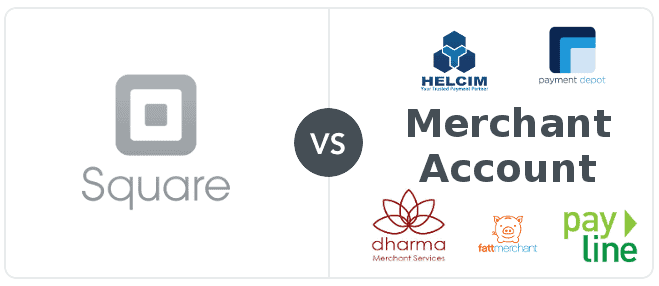Learn how to determine when Square is the best option for your small business and when it's time to get a merchant account instead.

What is Square, and is it the best option to accept payments for your small business?
Square has revolutionized the payment processing industry by making it easier for small businesses to accept credit cards. Gone are the days of long-term contracts, byzantine pricing plans, hidden fees, and expensive equipment. Square offers a simple, technology-based solution that is perfect for new businesses or small businesses that need a convenient all-in-one solution.
However, as your business grows, you may find that Square’s flat-rate pricing structure becomes too expensive. In this case, a full-service merchant account may be a better option. Merchant accounts offer a variety of features and pricing options that can be tailored to your specific needs. They can also offer more flexibility and control than Square.
Ultimately, the best credit card processing company for your small business will depend on your individual needs and circumstances. Here, we’ll help you evaluate the pros and cons of each option, allowing you to determine whether Square or a full-service merchant account will be the better selection for your business.
How Square Differs From A Merchant Account
With Square, there’s no application fee, and anyone is welcome to open an account. Square will ask you for some basic information about your business and verify your identity, but you won’t have to undergo an extensive underwriting process before being approved for an account. Instead, you’ll be up and processing within a few days.
On the other hand, obtaining a merchant account is much more complicated. The applications themselves are often quite streamlined, but you can expect the process to take longer. Part of this is because the processor’s underwriting department will scrutinize every aspect of your business to decide just how likely they are to encounter chargebacks (learn how to prevent chargebacks), claims of fraud, and everything else that processors hate to deal with. You might have several back-and-forths with a representative before you get approved for an account.
In this respect, Square is more advantageous for small or new businesses.
How Does Square Work?
When Square first launched, it offered little beyond basic credit card transaction processing and a rudimentary reporting and analytics feature. Today, Square has expanded its product and services lineup tremendously. It now offers just about every conceivable feature that you could expect to find with a traditional merchant account provider.
Square Merchant Services Include...
When you sign up for Square, you’ll immediately have access to a host of free features that are included in your account. The company also offers a number of more specialized optional features, for which you’ll have to pay a monthly fee. Here’s a brief breakdown of Square’s main features:
- Credit and debit card processing via EMV, NFC (contactless), and magstripe payment methods
- Access to Square Online, which includes a payment gateway and integrated shopping cart features
- Support for alternative payment methods, including card-on-file, invoices, and QR code payments
- Analytics and reporting features via the Square Dashboard
- One free Square Card Reader for magstripe payments
- Optional Square Card Reader for contactless and chip, Square Terminal, or Square Point-Of-Sale devices (available for purchase)
- Specialized services for specific industries, including Square Appointments, Square For Retail, and Square For Restaurants
- Extensive online knowledgebase
- Customer service via email and telephone
Signing up for an account with Square can be accomplished either on the Square website or from within the Square mobile app. In addition to creating a username and password, you’ll need to provide some basic information about your business. Once your account is created, you can begin accepting credit and debit card transactions.
For a more in-depth discussion of these and other services available from Square, please see our full review of Square Credit Card Processing and our complete guide to choosing Square POS credit card readers.
How Does A Merchant Account Work?
With all these services available, it’s easy to think of your Square account as a merchant account. However, that’s not really the case.
Square is a payment service provider (PSP), meaning it can process your credit card transactions, but doesn’t provide you with a true, full-service merchant account. Instead, your account is aggregated with those of other users into a single, huge merchant account.
The advantages of this approach include a fast, streamlined account approval process and the fact that Square handles all PCI compliance requirements for you at no additional cost. The primary disadvantage is that, because your business hasn’t been subjected to the usual thorough vetting process that’s needed for a merchant account, the possibility of a sudden account hold, freeze, or termination is significantly higher.
Merchant Accounts Include...
Merchant accounts, on the other hand, require you to undergo an extensive underwriting process before you can process your first transaction. This process typically requires a credit check, a lot of paperwork, and a lot of time. Even if you’re finally approved, you may have to wait up to two weeks from the time you submit your application until you can finally start accepting credit cards with your new account. However, by taking the time to go through this process in advance, you can minimize the chances of experiencing a hold, freeze, or termination later. Here are the main features that are typically available with a merchant account:
- Credit and debit card processing via EMV, NFC (contactless), and magstripe payment methods
- Access to a payment gateway (either proprietary or through a third-party provider) for accepting online transactions
- Support for eCheck and ACH payment methods (typically as a paid optional service)
- Online account access with real-time sales reporting and analytics features
- A variety of compatible credit card terminals, usually available for purchase, lease, or rent
- Support for advanced Point-Of-Sale (POS) systems
- Optional add-ons such as support for loyalty/gift cards, recurring billing, etc.
- Customer service via telephone and email
Comparison: Key Differences Between Square & A Merchant Account
Although both Square and a traditional merchant account allow you to accept credit and debit card payments, there are significant differences between them. The table below summarizes the most important differences you need to be aware of in deciding which option is best for your business:
| Square |
Merchant Accounts |
| Aggregated account, no unique Merchant ID number |
Full-service account, unique Merchant ID number |
| Pay-as-you-go billing (Square Free plan) |
Fees are billed every month, even if you don’t process any transactions |
| No long-term contract or early termination fee |
May include a long-term contract (typically 3 years) and an early termination fee (up to $500 on average) |
| No recurring monthly fees for a standard account (Square Free plan) |
Multiple recurring monthly & annual fees |
| Predictable flat-rate pricing |
Highly variable tiered, interchange-plus, or membership pricing |
In addition to these considerations, one of the primary differences between Square and traditional merchant accounts is that with Square, everyone is offered the same terms and prices. This isn’t usually the case with merchant accounts, where contract terms, fee schedules, and processing rates will all vary from one business to the next and can be adjusted in your favor with some aggressive negotiation.
Most traditional merchant account providers don’t disclose pricing information or contract terms on their websites, preferring to use a quote-based system tailored to each business’s size and needs.
Fortunately, there has been a very positive trend within the processing industry in recent years to offer prospective merchants more transparency—particularly on rates and fees. Most of our top-rated providers now provide extensive disclosures of processing rate plans, fee schedules, and contract terms right on their websites.
Merchants trying to decide on a provider can easily compare their estimated costs with what Square would cost them. For many small businesses, Square will indeed be the cheaper option. However, at higher processing volumes, the significantly lower interchange-plus rates offered by a full-service merchant account provider will prove to be the better bargain, even with the additional monthly and annual fees factored in.
Note that if you’re in a high-risk industry, your choices will be much more limited. Square’s Prohibited Use Policy essentially blocks almost all high-risk merchants from using it. The sole exception is a special program for CBD businesses, which comes with much higher processing rates than those offered to low-risk businesses.
Many full-service merchant account providers don’t accept high-risk businesses either, so you’ll have to seek out one of the best high-risk merchant account providers to get credit card processing for your business.
Does The Difference Between Square & Traditional Credit Card Processing Matter?
If you’re a small business owner, you may be wondering why you would want to choose a merchant account over simply using Square. The truth is that, for many small and seasonal businesses, Square usually is the cheapest and easiest option available. With no monthly fees and no long-term commitment, you can use it as little or as much as you need to, without paying anything extra. Square is a particularly attractive option to seasonal merchants, who often get stuck paying monthly fees even during the months when their business is closed.
However, it’s important to understand that Square isn’t always the best option, even for smaller businesses. The risk of suddenly having your account shut down without advance notice can be a dealbreaker, although there are ways to lower the chances of this happening. Also, Square can actually be more expensive than a merchant account at higher processing volumes, even without all the extra monthly fees.
Is Square Cheaper Than Other Merchant Services?
|
Square |
Merchant Account |
| Pricing Model |
Flat-rate |
Tiered, interchange-plus, or membership |
| Monthly Fees |
$0-$29+ |
Variable, usually at least $10/month |
| Early Termination Fee/Cancellation Fee |
None |
Variable, $0-$500 or higher |
| Hardware Options |
Proprietary (can only be used with Square) |
Usually universal (can be reprogrammed to work with a different provider) |
| Ideal For |
Small or newly established business (less than $5K/month processing volume) |
Medium-large business (over $5K/month processing volume) |
The table above summarizes the main differences between Square and a traditional merchant account. As you can see, Square differs from most merchant account providers in one very significant way: transparency. While merchant account pricing and contract terms can be highly variable, Square offers you all the information you’ll need to make an informed decision upfront. Your least expensive option will depend not only on the nature and size of your business but also on the rates and terms offered by competing merchant account providers.
As a very general rule, Square usually costs less overall if your business processes less than $5,000 per month in credit and debit card transactions. Above this amount, a good merchant services provider can be less expensive. However, it’s important to remember that the $5,000 figure is nothing more than a very general average. We’ve seen figures as low as $1,500 per month and as high as $10,000 per month as the suggested “tipping point” where a merchant account makes more sense.
Coming up with a reasonably accurate “tipping point” for your business is something that only you can determine, based on your needs and variables such as your monthly processing volume, average ticket size, etc. If you need some help with “doing the math,” we highly recommend our e-book, Don’t Overpay For Credit Card Processing: How To Find A Great Merchant Services Provider & Lower Your Costs, for a detailed explanation (complete with spreadsheets) about how to estimate your total costs with Square or a competing merchant account provider.
Note: In an effort to address the potentially high cost of its flat-rate processing for high-volume businesses, Square also offers customized pricing for merchants processing over $250,00 per year. While it’s uncertain what type of processing rates are offered or whether you’ll have a fully underwritten merchant account, your processing rates should be significantly lower than the standard ones advertised on the Square website.
Which Is Best For My Business Needs: A Merchant Account Or Square?
Selecting a payment processor for your business isn’t simply a matter of choosing the cheapest option. You’ll also want to factor in other considerations, such as the availability of ancillary services, hardware and software options, and (most importantly) the quality of customer support.
Choose Square If…
Is Square right for your business? It’s been an affordable option for millions of users over the years, and the company’s ever-expanding line of products and services makes it a solid alternative to a traditional merchant account. It’s also a great option for very small businesses that otherwise wouldn’t be able to afford a full-service merchant account. You’ll usually find Square to be the better choice in the following use cases:
- Part-time or seasonal businesses
- Businesses that only occasionally need to accept a credit card payment
- Small nonprofits
- Full-time businesses that typically process less than $5,000 per month
Choose A Merchant Account If…
As great as Square is, it’s not the best option for everyone. A larger, more established business will generally be better off with a true merchant account due to the lower processing rates, availability of more sophisticated hardware and software, improved account stability, and generally better customer support. You should choose a merchant account (from a top-rated provider) if the following criteria apply to your business:
- Full-time businesses that operate year-round
- Businesses that accept credit cards on a daily basis
- Large nonprofits
- Businesses that typically process over $5,000 per month
In the world of payment processing, there is no one-size-fits-all solution. The age of your business, its size, your industry, and even how you operate daily all factor into choosing a payment processor. It’s quicker to get started with Square, but you may be sacrificing account stability and responsive customer service. As always, the decision comes down to which option offers the most overall value for the best price.












